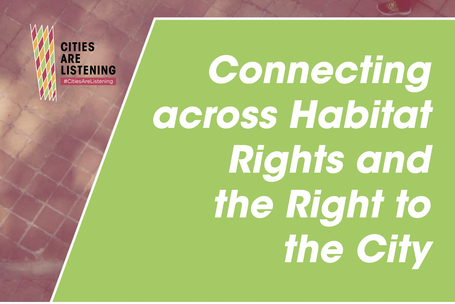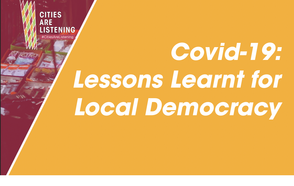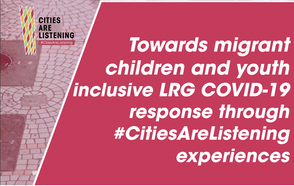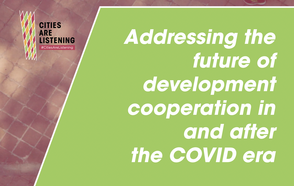
Civil society and local governments join forces with UN Special Rapporteurs in a first roundtable to discuss possible paths for joint work
On Friday, December 4th, the Global Platform for the Right to the City (GPR2C), Habitat International Coalition (HIC) and United Cities and Local Governments (UCLG) co-hosted, as part of the #CitiesAreListening process, the roundtable“Connecting across Habitat Rights and the Right to the City”: a starting point to strengthen cooperation between Special Rapporteurs, civil society organizations and local and regional governments under the framework of Human Rights related to Habitat and the Right to the City. This first roundtable counted with the invaluable participation of Mr. Pedro Arrojo-Agudo, UN Special Rapporteur on human rights to safe drinking water and sanitation; Mr. Felipe González Morales, UN Special Rapporteur on the Human Rights of migrants; Mr. Victor Madrigal-Borloz, UN independent Expert on protection against violence and discrimination based on sexual orientation and gender identity and Mr. Balakrishnan Rajagopal, UN Special Rapporteur on the right to adequate housing.
How do the priorities of Special Rapporteur mandates intersect with Human Rights related to Habitat and the Right to the City? And with those of civil society organizations and local and regional governments more generally?
The roundtable began looking at the main priorities of each mandate holder and at their intersections with the Habitat Rights and the Right to the City approach. Below, you can see a summary of the main points raised during their interventions.
Right to Safe Drinking Water and Sanitation - Mr. Pedro Arrojo-Agudo, UN Special Rapporteur
- Water and sanitation is a cross-cutting issue of key importance for the most vulnerable and marginalized groups, including indigenous peoples, informal settlement dwellers, migrants and refugees.
- Access to safe drinking water and hygiene goes hand in hand with access to adequate housing and public health.
- Coordination and continuous work with civil society and local and regional governments is critical, as well as building networks between these actors, universities and experts in our communities.
Right of Migrants - Mr. Felipe González Morales, UN Special Rapporteur
- Protecting human rights of migrants is deeply interconnected with all mandates, particularly in terms of access to public services such as health, education, justice, and housing.
- It is important to ensure that migrants do not avoid seeking support due to fear of being detained or deported through establishing strong firewalls between public services and enforcement of migratory agencies.
- It is key to advance on the regularization of migrants in cities, which entails collaboration between local and regional governments and civil society to ensure social inclusion and integration versus assimilation, moving away from the criminalization of migrants, and securing migrants’ participation in civic spaces.
- It is crucial to ensure permanent representation of associations of mayors and CSOs in the implementation and follow-up of the Global Compact on Migration.
Right to Protection against Violence and Discrimination based on Sexual Orientation and Gender Identity - Mr. Víctor Madrigal-Borloz, UN Independent Expert
- The particular experiences of LGBTQI+ populations are intrinsically linked to the Right to the City.
- LGBTQI+ identities should not be confined to the private sphere: they constitute political identities that require and deserve political occupancy. Beyond decriminalization, all levels of government need to ensure promotion of tolerance, diversity and pluralism as underpinning the construction of cities and territories.
- All levels of government need to take affirmative action to ensure the protection of LGBTQI+ people from shaming, exclusion and abuse in public spaces, including safe streets, parks, transport and equipment. This includes acknowledging, addressing and condemning laws related to public space that can be used to criminalise the presence of LGBTQI+ people like the so-called “LGBTQI+ free-zones”.
- All levels of government, together with police corpus, need to be engaged to promote an understanding of the heightened risks that LGBTQI+ populations face, bettering relations and opening lines of communication and mutual understanding.
Right to Adequate Housing - Mr. Balakrishnan Rajagopal, UN Special Rapporteur
- The intersection between issues of non-discrimination and spatial segregation according to ethnicity, religion, sexual orientation or gender identity, perpetuated by disposession and constituting new manifestations of apartheid.
- A priority for the mandate is to address the interrelation between displacement and impacts of climate change by ensuring populations’ right to remain or to leave. In both cases, the consent of affected populations is key.
- The ability of government at all levels to stop evictions as a key lesson of COVID-19. With political will, government actions can make a tangible difference, with local and regional governments at the fore of innovative action.
- The need to rethink land governance beyond ensuring tenure security. Since property is central to economic systems, it is necessary to promote economic alternatives such as solidarity economy approaches along a rural-urban continuum, adopting a more “pluriversal” approach to housing, pushing for an increased valorization of rural, indigenous and other forms of housing, and addressing the issue of land sovereignty.
Reactions and Priorities from civil society organizations and the local and regional governments constituency
Representatives of the three co-organizers and constituencies reacted by sharing their key priorities for their organizations and constituencies, summarized below:
Philipp Rio - Mayor of Grigny and Co-President of UCLG's Committee on Social Inclusion, Participatory Democracy and Human Rights (CISDPHR)
- Local and regional governments are the closest level of government to citizens and, as the guarantors of service provision, need to be included in decision making spaces.
- The need for a new form of multilateralism that is more inclusive and based on the needs of communities. Given the connection between the objectives of mandate holders and local public service provision, it is vital that local and regional governments and special rapporteurs collaborate to ensure no one and no place is left behind.
Maite Rodriguez Blandón - Coordinator of the Women and Habitat Latin American Network and representing the GPR2C Women, Gender and Diversity Working Group
- The importance of the Right to the City framework, as an integral approach that allows to see the interdependence and interconnection between rights and its expression in the territory and communities.
- The need to adopt an intersectional approach that engages with the feminist agenda regarding habitat rights and the Right to the City, incorporating elements such as the discussion on public and private spheres, the division of labour along gender lines, and different uses of time, spaces and facilities.
- How COVID-19 exposed the fragility in the protection of rights of women and girls in different territories, spanning access to food, housing, security and the digital gap, among others relevant dimensions.
Joseph Schechla - Coordinator of the HIC - Housing and Land Rights Network
- There is a need to combine the city and urban context as a particular locus of struggle, but also not to forget the universality of already-codified and emerging human rights and the more inclusive concept of the human habitat.
- It is important to valorize rural areas and residents, accompanied by a consciousness about climate change, the importance of the continuum of legitimate tenure, the need for de-commodification, and treating land as a universal human need and human right, from the perspective of its social function. The inclusivity and terminology of the human rights habitat is important as well as the recognition of such intersectional and transversal approaches in foregoing commitments, such as the Habitat II Agenda.
How can we strengthen collaboration between mandate holders, civil society organizations and local governments?
Building on the identification of common thematic priorities, the discussion shifted to explore existing and potential paths for collaboration. Rapporteurs stressed the importance of working with civil society organizations, local governments and other stakeholders, such as academic networks, with Mr. Gonzalez Morales noting the increase of participation and outreach between civil society organizations and mandate holders over the last decade. Such trend can be further enhanced through efforts in expanding the outreach towards communities and the visibility of their work, as expressed by Maria Silvia Emannuelli, Coordinator of HIC Latin America, citing the possibility of producing materials with engaging and accessible language, using social media and videos, and holding online consultations even after travel restrictions are lifted.
Mr. Arrojo and Mr. Rajagopal pointed out the possibilities of joint work with local authorities also in terms of implementing recommendations, in areas such as the management of water and sanitation services or the reimagining of land governance at the local level. In this sense, Amanda Flety Martínez, Coordinator of UCLG’s Commission on Social Inclusion, Participatory Democracy and Human Rights (CSIPDHR), pointed out how the decisions made by local and regional governments have direct impact on Habitat Rights and the Right to the City, noting far example the experiences between
CSIPDHR and cities with the remunicipalisation of water, citizenship for migrants in cities, or measures for tackling spatial segregation.
[Clip 4: SRs share highlighted mechanisms for cooperation + comment from moderator Rodrigo Faria]
While collaboration has been ongoing, mandate holders, such as Mr. Gonzalez Morales and Mr. Arrojo, have agreed that it is key to advance towards more permanent forms of dialogue with civil society organizations and local governments, a point echoed by civil society organizations’ representatives. Ms. Emannuelli raised the possibility of reactivating an advisory group to UN-Habitat focused on forced evictions, while Irene Escorihuela (Observatori DESC/GPR2C) also pointed to the possibility of working jointly with mandate holders on guidelines on particular themes, such as the Right to the City. Both of them as well as Mr. Rajagopal have also stressed the importance of working together in a more stable manner in the follow-up of communications and country visits, but also around UN Human Rights Treaty Bodies committees’ decisions.
The opportunities for expanded cooperation between mandates was also highlighted by Mr. Madrigal and Mr. Arrojo, pointing out previous and ongoing collaboration with other mandate holders. Mr. Rajagopal raised the possibility of working with civil society organizations on how they can engage with the judiciary in more creative ways, noting its role in terms of evictions; a similar point made by Ms. Escorihuela, who also highlighted the possibilities for transversal work on the increasing trend on privatization of housing, water, other services and spheres of urban life.
Finally, Mr. Rajagopal also noted the importance of a joint alliance between mandate holders, civil society organizations and local governments in diversifying the spaces for action in the multilateral system, noting the increasing importance of cities regarding multilateralism and plurilateralism. Such comment was also echoed by Rodrigo Faria Iacovini from the GPR2C, noting the importance of joint action so civil society organizations and local governments can have an impact on an international system that is still mostly dominated by nation-states.
[Clip 5: responses on mechanisms for cooperation by CSOs and local government organizations ]
Moving Forward: the start of a permanent dialogue
These inputs set the stage for increased cooperation between mandate holders, civil society organizations and local governments under the framework of Habitat rights and the Right to the City. Wrapping up the session, Adriana Allen, President of Habitat International Coalition, highlighted that, while the conversation started with the aim of ‘connecting’, throughout the dialogue, the collective intent to work together became explicit and stronger, with concrete and powerful proposals to move forward. Meanwhile, Emilia Saiz, UCLG Secretary General, pointed out that working together is the only way to ensure that local communities and governments can play an active role in shaping the future. Finally, Lorena Zárate, from the GPR2C Support Team, stressed that this meeting was only the beginning of a collective path to foreground a spatial and territorial approach to link all the different challenges being faced, reminding that the conversation will be continued in 2021, as a second chapter of the dialogue will take place with other mandate holders, to expand and build upon the first round of discussion.
[Clip 6: closing remarks by Lorena Zárate, Adriana Allen and Emilia Saiz]













